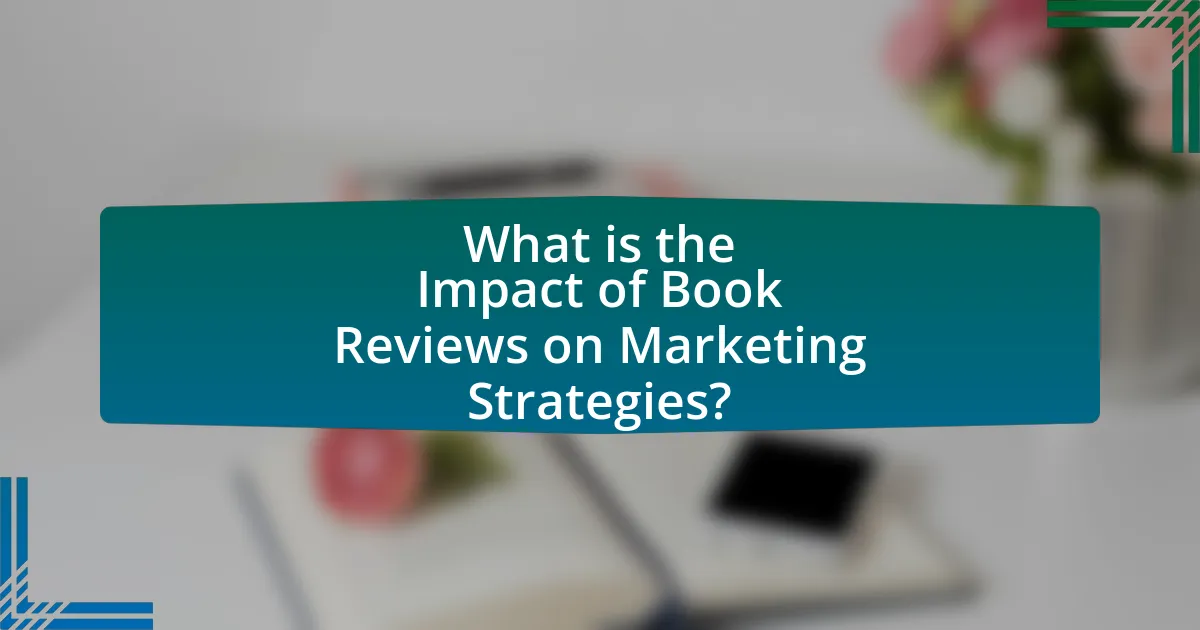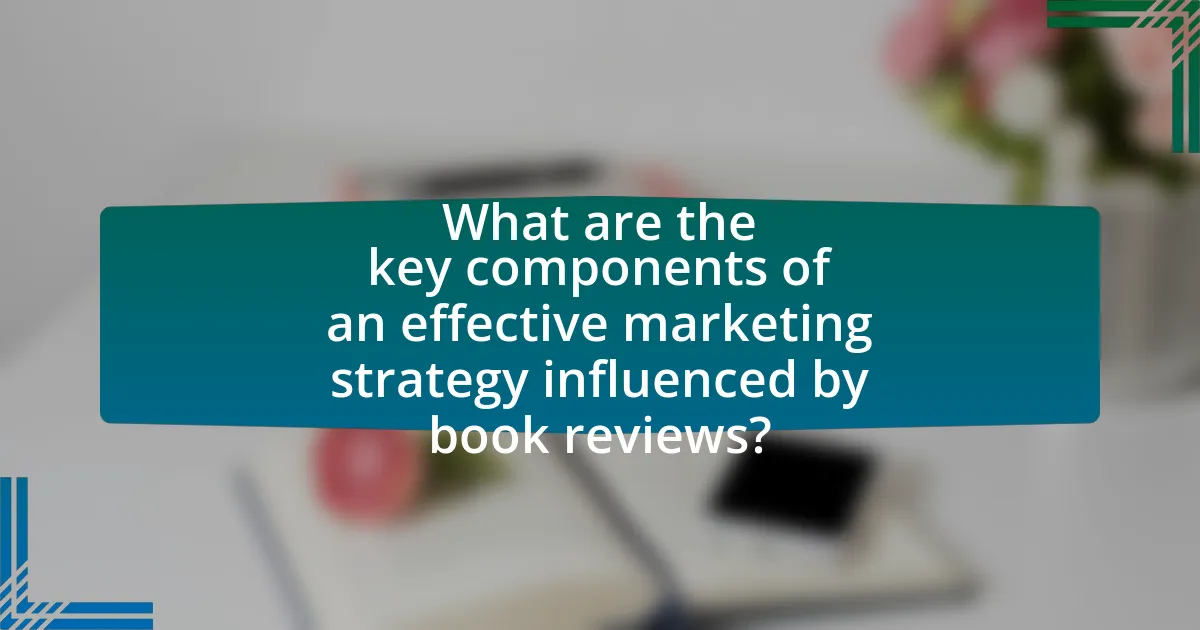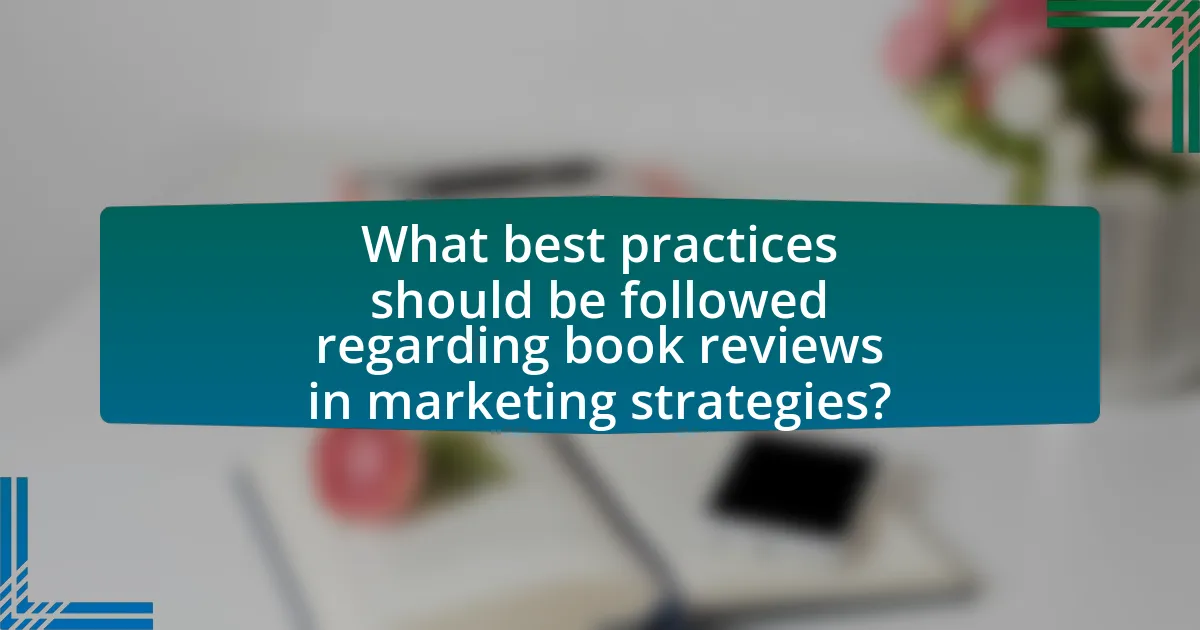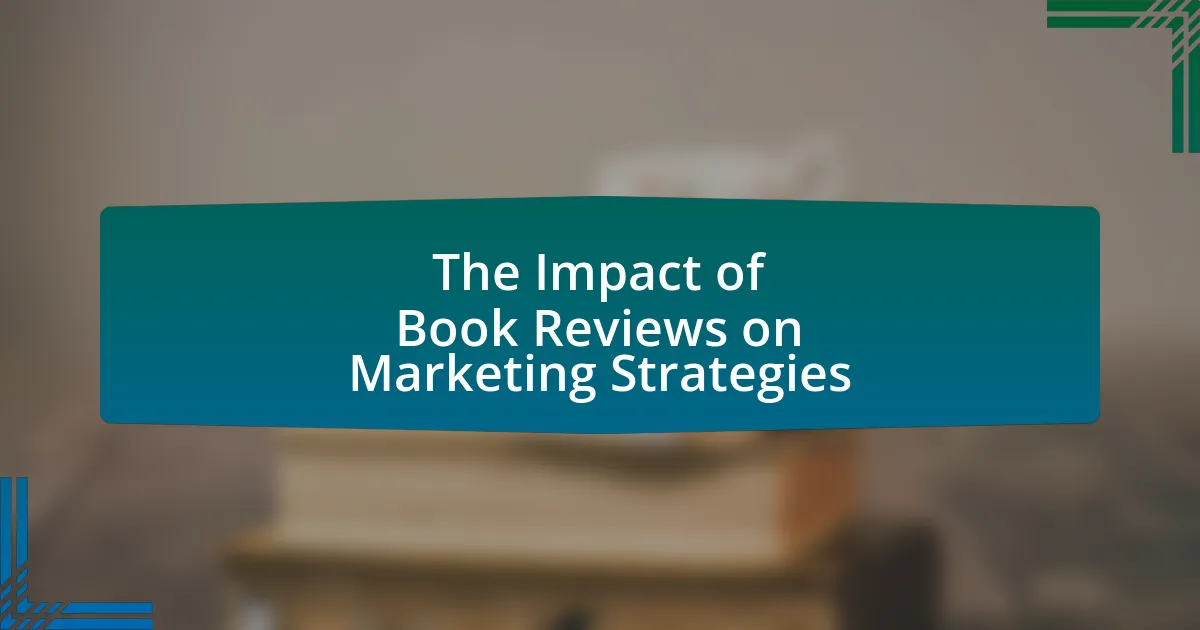The article examines the significant impact of book reviews on marketing strategies, emphasizing their role in shaping consumer perceptions and influencing purchasing decisions. It highlights that 79% of consumers trust online reviews as much as personal recommendations, illustrating the importance of positive and negative reviews in driving sales and brand reputation. The discussion includes psychological factors affected by reviews, the differences in impact between positive and negative feedback, and the influence of various review platforms on marketing effectiveness. Additionally, it outlines best practices for leveraging reviews, addressing negative feedback, and ensuring ethical considerations in review solicitation.

What is the Impact of Book Reviews on Marketing Strategies?
Book reviews significantly influence marketing strategies by shaping consumer perceptions and driving purchasing decisions. Positive reviews enhance a book’s credibility, leading to increased sales and visibility, while negative reviews can deter potential readers. Research indicates that 79% of consumers trust online reviews as much as personal recommendations, highlighting their critical role in marketing. Additionally, books with higher ratings on platforms like Goodreads and Amazon often see a boost in sales, demonstrating the direct correlation between review sentiment and market performance.
How do book reviews influence consumer purchasing decisions?
Book reviews significantly influence consumer purchasing decisions by shaping perceptions of a book’s quality and appeal. Research indicates that 79% of consumers trust online reviews as much as personal recommendations, highlighting the power of reviews in guiding choices. Positive reviews can enhance a book’s visibility and credibility, leading to increased sales, while negative reviews can deter potential buyers. A study published in the Journal of Marketing Research found that books with higher ratings on platforms like Goodreads experience a 20% increase in sales compared to those with lower ratings. This demonstrates that consumer trust in reviews directly correlates with purchasing behavior.
What psychological factors are affected by book reviews?
Book reviews significantly affect psychological factors such as social proof, cognitive dissonance, and emotional engagement. Social proof influences readers’ perceptions of a book’s value, as positive reviews can enhance credibility and desirability, leading to increased interest and sales. Cognitive dissonance occurs when readers experience conflicting thoughts about a book after reading reviews; for instance, a negative review may lead them to question their initial interest or choice. Emotional engagement is heightened through reviews that resonate with readers’ experiences or expectations, fostering a connection that can drive purchasing decisions. Research indicates that 79% of consumers trust online reviews as much as personal recommendations, underscoring the impact of book reviews on consumer behavior and decision-making processes.
How do positive and negative reviews differ in their impact?
Positive and negative reviews differ significantly in their impact on consumer behavior and purchasing decisions. Positive reviews generally enhance a product’s reputation, leading to increased sales and customer trust, as evidenced by a study from Harvard Business School which found that a one-star increase in Yelp ratings can lead to a 5-9% increase in revenue. In contrast, negative reviews can deter potential customers, often resulting in decreased sales and a tarnished brand image; research from the University of California, Berkeley indicates that consumers are more likely to share negative experiences, amplifying their impact through social media and word-of-mouth. Thus, the contrasting effects of positive and negative reviews highlight their critical roles in shaping marketing strategies.
What role do book reviews play in brand perception?
Book reviews significantly influence brand perception by shaping consumer opinions and trust. Positive reviews enhance a brand’s credibility, leading to increased sales and customer loyalty, while negative reviews can damage reputation and deter potential readers. Research indicates that 79% of consumers trust online reviews as much as personal recommendations, highlighting the critical role reviews play in shaping perceptions. Furthermore, a study published in the Journal of Marketing Research found that books with higher ratings and more reviews tend to sell better, demonstrating the direct correlation between review sentiment and brand image in the literary market.
How can book reviews enhance or damage an author’s reputation?
Book reviews can significantly enhance or damage an author’s reputation depending on their content and reception. Positive reviews can elevate an author’s status, leading to increased sales and wider readership, as evidenced by a study from the University of Pennsylvania which found that books with favorable reviews saw a 30% increase in sales. Conversely, negative reviews can tarnish an author’s image, resulting in decreased sales and loss of credibility; for instance, a harsh critique in a prominent publication can deter potential readers and diminish an author’s perceived expertise. Thus, the nature of book reviews plays a crucial role in shaping public perception and market success for authors.
What is the relationship between book reviews and reader trust?
Book reviews significantly influence reader trust by providing social proof and credibility. When potential readers encounter positive reviews, they are more likely to perceive the book as trustworthy and worth their time, as studies indicate that 79% of consumers trust online reviews as much as personal recommendations. This trust is further reinforced by the authenticity of reviews, as genuine feedback from other readers helps to establish a book’s reputation. Consequently, the relationship between book reviews and reader trust is critical in shaping purchasing decisions and marketing strategies in the publishing industry.
How do different platforms for book reviews affect marketing strategies?
Different platforms for book reviews significantly influence marketing strategies by shaping audience engagement and visibility. For instance, platforms like Goodreads and Amazon provide user-generated reviews that can enhance a book’s credibility and attract potential readers, leading to increased sales. Research indicates that 79% of consumers trust online reviews as much as personal recommendations, highlighting the importance of positive reviews on these platforms. Additionally, social media platforms allow authors and publishers to engage directly with readers, fostering community and encouraging word-of-mouth marketing. This interaction can lead to viral marketing effects, as seen in campaigns that leverage book influencers on platforms like Instagram and TikTok. Thus, the choice of review platform directly impacts how effectively a book reaches its target audience and the overall success of its marketing strategy.
What are the advantages of using social media for book reviews?
Using social media for book reviews offers several advantages, including increased visibility, immediate feedback, and community engagement. Social media platforms allow authors and publishers to reach a broader audience quickly, as posts can be shared and liked, amplifying their reach. Immediate feedback from readers helps authors understand audience preferences and improve future works. Additionally, social media fosters a sense of community among readers, encouraging discussions and recommendations that can significantly influence purchasing decisions. According to a survey by Pew Research Center, 72% of adults use social media, making it a vital tool for connecting with potential readers and enhancing marketing strategies.
How do traditional review platforms compare to modern ones?
Traditional review platforms primarily focus on written reviews and ratings, while modern platforms leverage multimedia content and social sharing features. Traditional platforms, such as print magazines and websites like Goodreads, often rely on text-based reviews that can be slower to disseminate and may lack real-time interaction. In contrast, modern platforms like social media and video review sites enable instant feedback, user engagement, and the ability to share reviews widely, enhancing visibility and reach. For instance, a study by the Pew Research Center in 2021 indicated that 72% of adults use social media to discover new products, highlighting the effectiveness of modern platforms in influencing consumer decisions compared to traditional methods.

What are the key components of an effective marketing strategy influenced by book reviews?
An effective marketing strategy influenced by book reviews includes leveraging social proof, targeting specific audiences, and enhancing online visibility. Social proof is established through positive reviews that build credibility and trust, as studies show that 79% of consumers trust online reviews as much as personal recommendations. Targeting specific audiences involves analyzing the demographics and preferences of readers who engage with reviews, allowing for tailored marketing efforts. Enhancing online visibility can be achieved by optimizing content for search engines and utilizing social media platforms to share reviews, which can increase discoverability and engagement. These components collectively contribute to a marketing strategy that effectively utilizes book reviews to drive sales and brand loyalty.
How can authors and publishers leverage positive reviews?
Authors and publishers can leverage positive reviews by prominently displaying them in marketing materials and on sales platforms. This strategy enhances credibility and attracts potential readers, as studies show that 70% of consumers trust online reviews as much as personal recommendations. Additionally, incorporating positive reviews into social media campaigns can increase engagement and reach, further amplifying the book’s visibility. By utilizing testimonials in promotional content, authors and publishers can effectively influence purchasing decisions and build a loyal readership.
What strategies can be employed to highlight positive reviews in marketing?
To highlight positive reviews in marketing, businesses can utilize strategies such as showcasing testimonials on websites, leveraging social media platforms, and incorporating reviews into advertising campaigns. For instance, displaying customer testimonials prominently on a homepage can increase trust and conversion rates, as studies show that 79% of consumers trust online reviews as much as personal recommendations. Additionally, sharing positive reviews on social media can enhance engagement and reach, with 88% of consumers trusting user-generated content. Incorporating snippets of positive reviews in advertisements can also attract potential customers, as 72% of consumers say positive reviews increase their trust in a brand. These strategies effectively leverage the power of positive reviews to enhance marketing efforts.
How can testimonials from reviews be integrated into promotional materials?
Testimonials from reviews can be integrated into promotional materials by prominently featuring direct quotes from satisfied readers in advertisements, social media posts, and on websites. This approach leverages social proof, as studies show that 79% of consumers trust online reviews as much as personal recommendations, enhancing credibility and attracting potential customers. By strategically placing these testimonials in high-visibility areas, such as book covers, email newsletters, and promotional flyers, marketers can effectively communicate the value of the book and encourage purchases.
What tactics can mitigate the effects of negative reviews?
To mitigate the effects of negative reviews, businesses can implement proactive engagement strategies, such as responding promptly and professionally to the reviews. This approach demonstrates to potential customers that the business values feedback and is committed to resolving issues. Research indicates that 70% of consumers are more likely to use a business that responds to negative reviews, as it reflects a commitment to customer service. Additionally, encouraging satisfied customers to leave positive reviews can help balance the overall perception, as studies show that a higher volume of positive reviews can dilute the impact of negative ones.
How should authors respond to negative reviews to protect their brand?
Authors should respond to negative reviews with professionalism and empathy to protect their brand. Acknowledging the reviewer’s perspective demonstrates respect and can mitigate potential damage to the author’s reputation. For instance, responding promptly and thanking the reviewer for their feedback can show that the author values reader opinions, which can foster goodwill. Additionally, addressing specific concerns raised in the review can illustrate the author’s commitment to improvement and engagement with their audience. Research indicates that authors who engage constructively with criticism can enhance their public image and maintain reader loyalty, as seen in studies on consumer behavior and brand perception.
What proactive measures can be taken to minimize negative feedback?
To minimize negative feedback, authors and publishers should actively engage with their audience and solicit constructive criticism. By creating open channels for communication, such as social media platforms and author websites, they can address concerns before they escalate into negative reviews. Research indicates that 70% of consumers are more likely to leave positive feedback when they feel their opinions are valued, highlighting the importance of proactive engagement. Additionally, implementing a robust quality control process, including professional editing and beta reading, can significantly reduce the likelihood of negative feedback stemming from content issues.
How can data from book reviews inform future marketing decisions?
Data from book reviews can inform future marketing decisions by providing insights into reader preferences, sentiment, and engagement levels. Analyzing the language and themes in reviews allows marketers to identify which aspects of a book resonate most with audiences, guiding promotional strategies. For instance, a study by Nielsen Book Research found that 70% of readers are influenced by online reviews when making purchasing decisions, highlighting the importance of leveraging this data to tailor marketing campaigns effectively. By understanding the strengths and weaknesses highlighted in reviews, marketers can adjust their messaging, target specific demographics, and enhance overall marketing effectiveness.
What metrics should be analyzed from book reviews for strategic planning?
The metrics that should be analyzed from book reviews for strategic planning include overall rating, sentiment analysis, review volume, and key themes or keywords. Overall rating provides a quantitative measure of reader satisfaction, while sentiment analysis reveals the emotional tone of the reviews, indicating how readers feel about the book. Review volume indicates the level of engagement and interest in the book, which can inform marketing efforts. Key themes or keywords extracted from reviews highlight specific aspects that resonate with readers, guiding content and promotional strategies. These metrics collectively enable publishers and marketers to make data-driven decisions that align with consumer preferences and enhance marketing effectiveness.
How can trends in reviews guide content creation and marketing efforts?
Trends in reviews can guide content creation and marketing efforts by providing insights into customer preferences and pain points. Analyzing review patterns allows marketers to identify which themes resonate with readers, enabling them to tailor content that addresses specific interests or concerns. For instance, if reviews frequently highlight a particular character’s development or a unique plot twist, content creators can focus on these elements in promotional materials or social media campaigns. Research indicates that 79% of consumers trust online reviews as much as personal recommendations, underscoring the importance of aligning marketing strategies with review trends to enhance engagement and conversion rates.

What best practices should be followed regarding book reviews in marketing strategies?
Best practices for book reviews in marketing strategies include soliciting authentic reviews, leveraging social proof, and utilizing multiple platforms for visibility. Authentic reviews enhance credibility, as studies show that 79% of consumers trust online reviews as much as personal recommendations. Social proof, such as showcasing positive reviews prominently, can significantly influence purchasing decisions, with 70% of consumers stating that positive reviews increase their trust in a brand. Additionally, distributing reviews across various platforms, including social media, websites, and email newsletters, maximizes reach and engagement, leading to a broader audience and increased sales.
How can authors encourage more reviews from readers?
Authors can encourage more reviews from readers by actively engaging with their audience and making the review process easy and accessible. Engaging with readers through social media, newsletters, and book signings fosters a community where readers feel valued and more inclined to share their thoughts. Additionally, providing clear instructions on how to leave a review, including links to platforms like Amazon or Goodreads, simplifies the process and increases the likelihood of receiving feedback. Research indicates that authors who personally request reviews from their readers see a significant increase in the number of reviews received, as personal outreach creates a sense of connection and accountability.
What methods are effective in soliciting honest feedback?
Effective methods for soliciting honest feedback include creating a safe and anonymous environment, using open-ended questions, and actively listening to responses. A safe and anonymous environment encourages individuals to share their true opinions without fear of repercussions, which is supported by research indicating that anonymity increases the likelihood of honest responses. Open-ended questions allow for more detailed feedback, enabling respondents to express their thoughts freely, as shown in studies that highlight the depth of insights gained from such questions compared to closed ones. Actively listening to feedback fosters trust and shows that the feedback is valued, which can lead to more candid responses in future interactions.
How can authors create a community around their work to foster reviews?
Authors can create a community around their work to foster reviews by actively engaging with their audience through social media platforms, author websites, and book clubs. By sharing insights about their writing process, hosting Q&A sessions, and encouraging discussions about their books, authors can build a loyal following. Research indicates that authors who interact with readers on platforms like Goodreads and Instagram see a significant increase in reviews, as personal connections motivate readers to share their thoughts. Additionally, offering exclusive content or early access to new works can incentivize community members to provide feedback and reviews, further enhancing the author’s visibility and credibility in the market.
What ethical considerations should be taken into account with book reviews?
Ethical considerations in book reviews include honesty, transparency, and respect for intellectual property. Reviewers must provide truthful assessments of the book’s content, avoiding exaggeration or misrepresentation to maintain credibility. Transparency involves disclosing any potential conflicts of interest, such as receiving a free copy from the author or publisher, which can influence the review’s objectivity. Respect for intellectual property entails acknowledging the original ideas and contributions of the author, avoiding plagiarism, and giving proper credit. These ethical standards are essential for fostering trust between reviewers, authors, and readers, ultimately impacting the effectiveness of marketing strategies based on reviews.
How can authors ensure transparency in their review solicitation practices?
Authors can ensure transparency in their review solicitation practices by clearly communicating their intentions and criteria for selecting reviewers. This involves providing potential reviewers with detailed information about the book, the review process, and any specific guidelines they should follow. Transparency can be further enhanced by openly disclosing any affiliations or incentives related to the review, as well as by maintaining a consistent and fair approach in selecting reviewers. Research indicates that transparency in solicitation practices fosters trust and credibility, which are essential for effective marketing strategies in the context of book reviews.
What are the consequences of manipulating reviews?
Manipulating reviews can lead to severe consequences, including legal repercussions, loss of consumer trust, and damage to brand reputation. Legal consequences arise from violations of consumer protection laws, as false advertising can result in fines and lawsuits. For instance, the Federal Trade Commission (FTC) has imposed penalties on companies for deceptive review practices. Loss of consumer trust occurs when customers discover manipulated reviews, leading to decreased sales and loyalty. A study by BrightLocal found that 82% of consumers read online reviews, and 79% trust them as much as personal recommendations; thus, authenticity is crucial. Additionally, damaged brand reputation can result in negative publicity, further harming a company’s market position.
What are the common pitfalls to avoid in utilizing book reviews for marketing?
Common pitfalls to avoid in utilizing book reviews for marketing include relying solely on positive reviews, neglecting diverse reviewer perspectives, and failing to engage with negative feedback. Relying only on positive reviews can create a misleading image of the book, as potential readers may seek balanced opinions. Neglecting diverse perspectives limits the reach and relatability of the marketing strategy, as different audiences may resonate with various viewpoints. Additionally, failing to engage with negative feedback can damage credibility; addressing concerns shows responsiveness and can turn criticism into an opportunity for improvement. These pitfalls can hinder effective marketing and diminish the overall impact of book reviews on sales and audience engagement.
How can over-reliance on reviews backfire in marketing strategies?
Over-reliance on reviews can backfire in marketing strategies by creating a distorted perception of a product’s quality and leading to potential customer distrust. When businesses focus excessively on positive reviews, they may neglect to address negative feedback, which can result in a lack of transparency. According to a study by BrightLocal, 86% of consumers read reviews for local businesses, but 40% of them consider a business with no reviews to be untrustworthy. This indicates that an absence of balanced feedback can harm credibility. Furthermore, if consumers perceive that reviews are manipulated or overly curated, it can lead to skepticism and damage brand reputation. Thus, while reviews are valuable, an over-reliance on them without addressing the full spectrum of customer feedback can undermine marketing efforts.
What mistakes should authors avoid when responding to reviews?
Authors should avoid being defensive or confrontational when responding to reviews. This behavior can alienate potential readers and damage the author’s reputation. Instead, authors should focus on acknowledging feedback, whether positive or negative, and express gratitude for the reviewer’s time and insights. Research indicates that authors who engage constructively with reviews can enhance their credibility and foster a positive relationship with their audience, ultimately benefiting their marketing strategies.



